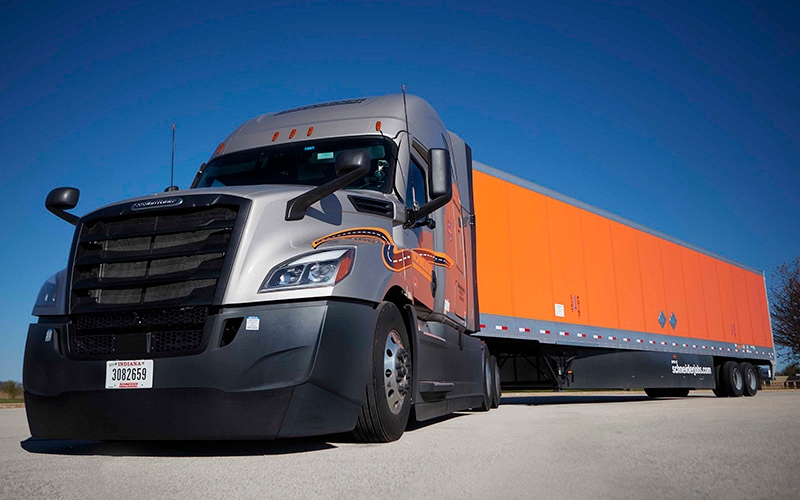
A semi truck, also known as a semi-trailer truck, is a large vehicle used for transporting goods. It consists of a tractor unit and a semi-trailer, with both components connected by a fifth-wheel coupling.
The tractor unit, also called the cab or the engine, provides the power to move the semi-trailer. Semi trucks play a crucial role in the transportation industry, allowing for the efficient movement of goods across long distances. From delivering consumer products to transporting raw materials, semi trucks are a common sight on highways and major thoroughfares.
Understanding the definition and significance of semi trucks is essential for anyone involved in logistics or interested in the mechanics of large-scale transportation. This article will delve deeper into the functions, features, and uses of semi trucks, shedding light on their importance in the modern economy.

Credit: schneiderjobs.com
Navigate As You Want:
The Basics Of Semi Trucks
A semi truck, also known as a tractor-trailer or an 18-wheeler, is a large vehicle used for transporting goods. It consists of a towing engine and a detachable trailer, making it capable of carrying heavy loads over long distances.
Semi trucks, also known as tractor-trailers or 18-wheelers, are incredibly influential vehicles in the logistics industry. They are specifically designed to transport large quantities of goods over long distances. Semi trucks consist of two main components: the tractor and the trailer.
The tractor, also called the cab or the truck itself, is where the driver sits and controls the vehicle. It is equipped with a powerful engine, transmission, and various control mechanisms. The trailer, on the other hand, is the part of the truck that carries the cargo. Trailers can vary in size and design depending on the type of freight being transported.
Semi trucks utilize a fifth wheel coupling mechanism that enables the connection between the tractor and the trailer. This allows for efficient distribution of weight and enhances stability during travel. The weight of the cargo is primarily supported by the trailer’s axles, which are responsible for ensuring safe and smooth transportation.
Overall, semi trucks play a crucial role in the transportation industry, facilitating the movement of goods across vast distances and contributing to global supply chains.
Types Of Semi Trucks
A semi truck, also known as a tractor-trailer or an articulated lorry, is a type of heavy-duty truck that consists of a tractor unit and a semi-trailer. It is primarily used for transporting large loads over long distances.
Semi trucks, also known as semis or tractor-trailers, are powerful vehicles designed to transport large amounts of goods. There are different configurations of semi trucks, including specialized types for specific industries such as refrigerated trucks for transporting perishable goods. Some semi trucks are equipped with multiple trailers, known as doubles or triples, to increase cargo capacity. Long-haul trucks are designed for extended journeys, while short-haul trucks are suitable for more localized transportation needs. Another type is the flatbed truck, which is adaptable for carrying a variety of cargo. Semi trucks play a critical role in the transportation and logistics industry, allowing for efficient movement of goods across long distances.
The Importance Of Semi Trucks
Semi trucks, also known as tractor-trailers or 18-wheelers, play a crucial role in the transportation industry. They are essential for the movement of goods across long distances, making them a vital component of the supply chain. Semi trucks significantly contribute to the economy by facilitating the delivery of goods to various destinations, thereby supporting numerous industries and businesses. The economic impact of semi trucks is substantial, as they are responsible for transporting a wide range of products, including food, fuel, and consumer goods, which directly affect the market and consumer availability.

Credit: www.topmarkfunding.com
Key Features And Specifications
A semi truck, also known as an articulated lorry or tractor-trailer, is a heavy-duty vehicle used for transporting goods. Its key features and specifications determine its efficiency and capabilities.
Size and weight restrictions play a crucial role in the operation of semi trucks. These vehicles are subject to regulations regarding their dimensions and weight, which vary by jurisdiction. Compliance with these limits is essential to ensure safe and legal transportation.
The engine and transmission of a semi truck contribute significantly to its performance. Most semi trucks are powered by diesel engines, known for their power and fuel efficiency. The transmission system, typically equipped with multiple gears, allows the driver to navigate different terrains and carry heavy loads with ease.
Safety features are paramount in semi trucks to protect both the driver and other road users. These vehicles are equipped with advanced braking systems, such as anti-lock brakes (ABS), that enhance control and reduce the risk of accidents. Additional safety measures may include collision warning systems, stability control, and electronic logging devices to ensure compliance with driving hours regulations.
Challenges And Future Developments
Semi trucks, also known as tractor-trailers or 18-wheelers, are the backbone of the transportation industry. These vehicles face several challenges and future developments. Environmental concerns form a significant challenge as the industry aims to reduce carbon emissions and environmental impact. Stricter regulations and the demand for cleaner fuels have paved the way for the development of advancements in technology to address these concerns.
The trucking industry is exploring various alternatives to traditional fuels, such as electric and hydrogen-powered semi trucks. These advancements aim to reduce greenhouse gas emissions while maintaining transportation efficiency. Improved fuel efficiency also plays a vital role in tackling these challenges, as it reduces both operational costs and environmental impact. Additionally, new technologies like telematics and autonomous driving have the potential to enhance safety, fuel efficiency, and overall performance.
While the challenges of environmental concerns and the need for technological advancements pose formidable obstacles, the future of semi trucks seems promising. With continuous innovation and a commitment to sustainability, the industry is on the path towards a greener and more efficient future.
Credit: en.wikipedia.org
Frequently Asked Questions For What Is The Definition Of Semi Truck
What Is A Semi Truck And How Does It Differ From A Regular Truck?
A semi truck, also known as a tractor-trailer or an 18-wheeler, consists of a powerful truck engine combined with a detachable trailer. Unlike regular trucks, semi trucks have a separate cabin and engine, allowing for heavy loads to be transported across long distances efficiently.
What Are The Dimensions And Weight Limits For Semi Trucks?
The dimensions and weight limits for semi trucks vary depending on local regulations. However, in the United States, the maximum weight limit for semi trucks is typically 80,000 pounds, while the maximum length can range from 53 to 65 feet.
It’s important for drivers to comply with these limits to ensure safety on the road.
What Is The Purpose Of A Sleeper Cab In A Semi Truck?
A sleeper cab, also known as a sleeper berth, is a compartment behind the driver’s seat that provides sleeping accommodations for long-haul truck drivers. It allows drivers to rest and sleep during their breaks, ensuring they are well-rested and able to safely continue their journey.
Sleeper cabs are equipped with beds, storage spaces, and sometimes even amenities like a small kitchen and bathroom.
How Much Fuel Does A Semi Truck Consume And How Does It Affect The Environment?
Semi trucks are known for their high fuel consumption due to their size and weight. On average, a semi truck can consume around 6 to 8 miles per gallon (MPG) of diesel fuel. This can have a significant impact on the environment, contributing to greenhouse gas emissions.
However, advancements in technology and the use of alternative fuels are being explored to reduce the environmental footprint of semi trucks.
Conclusion
A semi truck is a powerful vehicle designed to transport heavy loads over long distances. With its unique structure and ability to pull large trailers, it plays a crucial role in the transportation industry. Understanding the definition of a semi truck is important for anyone involved in logistics or interested in the mechanics of these impressive machines.
Emphasizing safety, efficiency, and the vital role they play, the importance of semi trucks cannot be overstated. With continuous advancements in technology, the future of these heavy-duty vehicles looks promising.





